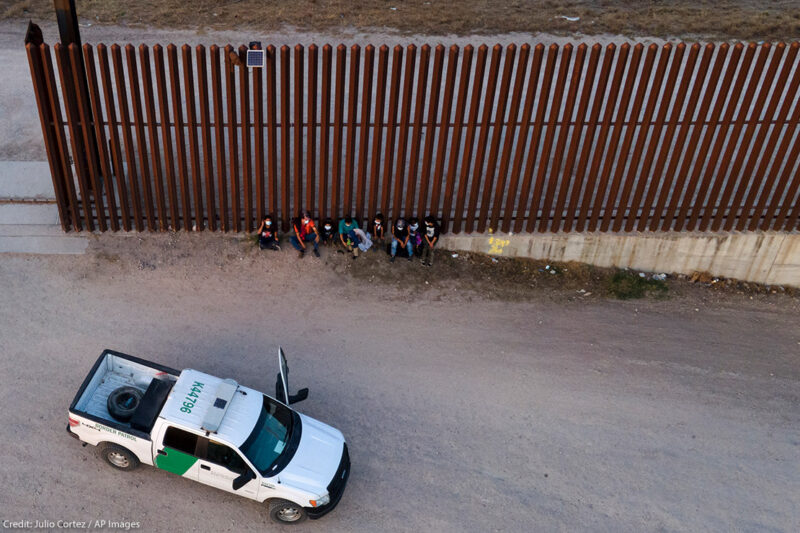New Guidance Fails to Stop Mistreatment of Pregnant People and Their Children in Detention


Recently, U.S. Customs and Border Protection (CBP) issued new guidance requiring baby bassinets and “snacks” to be available to infants and people who are pregnant, postpartum, or nursing in CBP detention. Neither are of comfort in hieleras — freezing cold, overcrowded holding cells notorious for their harsh conditions. And none of the added features included in the new policy can compensate for the physical and emotional strain of CBP detention conditions on people who are pregnant, postpartum, or nursing their newborns.
Though highly anticipated, CBP’s guidance falls embarrassingly short and will do little to address the well-documented pattern of mistreatment of pregnant people in the agency’s custody. The new guidance demonstrates that instead of moving away from detaining these uniquely vulnerable populations altogether, CBP is attempting to double down on unnecessary and dangerous detention practices.
In January 2020, the ACLU of San Diego & Imperial Counties (ACLU-SDIC) and the ACLU of Texas filed a complaint with the U.S. Department of Homeland Security’s Office of the Inspector General (OIG) calling for an immediate review of mistreatment of pregnant people detained in CBP facilities. Such mistreatment regularly imperiled the viability of pregnancies, even sometimes resulting in miscarriage. Nancy, one mother interviewed by the ACLU-SDIC, reported:
“...that the food she received was spoiled and served cold; she could not bring herself to eat it … [she] had been taken into custody in wet and mud-covered clothing, [and] was neither permitted a change of clothing nor provided a chance to shower for the duration of her detention.”
In April 2020, ACLU-SDIC filed a subsequent complaint on behalf of a pregnant woman who suffered mistreatment at the Chula Vista Border Patrol Station. After arresting her for routine processing, instead of facilitating her immediate access to critical medical care, CBP officers subjected her to a “rough ride” to a Border Patrol station, “jerk[ing] the steering wheel and slamm[ing] on the brakes.” Her experience only deteriorated inside the station, where she was forced to give birth while holding onto a trash can for support. The woman reported:
“Her husband heard the baby’s cries and, desperate to ensure the safety of his newborn child, lowered his wife’s pants and reached for the baby’s head, which was protruding out of her body. A Border Patrol agent and multiple medical staff also reached for the baby, some without gloves, and the baby was born. Although joyous about the birth of her child, [she] felt humiliated after realizing she had been surrounded by about 20 strangers, including multiple CBP agents and other unknown detained men, while she gave birth.”
The woman was finally taken to a hospital after she gave birth. After she was discharged, however, Border Patrol forced her to return to the Chula Vista Border Patrol Station for a night of postpartum detention together with her newborn baby.
In response to the complaint on behalf of the woman who gave birth at the Chula Vista Border Patrol Station, the OIG issued a report in July 2021 finding a number of deficiencies in the manner in which CBP and Border Patrol respond to in-custody births. The OIG recommended that CBP “expedite releases because holding U.S. citizen newborns at Border Patrol stations poses health, safety, and legal concerns.” Eleven senators wrote to Homeland Security Secretary Alejandro Mayorkas urging DHS to adopt a policy similar to one that Immigration and Customs Enforcement (ICE) adopted earlier this year, which states that “[g]enerally, ICE should not detain, arrest, or take into custody” people who are “known to be pregnant, postpartum, and/or nursing.” Instead of heeding the senators’ recommendations and following ICE’s lead on this issue, CBP has chosen a path of further detention, entrenching a practice that jeopardizes the safety and well-being of people like the ACLU-SDIC’s client and her newborn baby.
Among other things, CBP’s new guidance purports to improve access to medical care and basic items like snacks, liquids, and diapers in hieleras; conditions under which parents can nurse and change diapers in hieleras; and documentation of childbirths in hieleras. But it fails to address the fundamental problem that CBP detention in hieleras threatens the health and dignity of pregnant, postpartum, and nursing people and their newborns, and that a humane alternative exists. The risks of CBP detention that the new guidance purports to mitigate, including limited access to medical care, inadequate care for infants, and inconsistent documentation of in-custody births, could be prevented altogether if CBP instead prioritized the prompt release of people who are pregnant, postpartum, or nursing. This would avoid the possibility of in-custody births of U.S. citizen babies and alleviate the need to accommodate postpartum and nursing parents.
The July 2021 OIG report included images of the ACLU-SDIC’s client laying down on a concrete bench in a hielera with her newborn U.S. citizen baby wrapped in an aluminum blanket for warmth. CBP’s response to this disturbing image was to suggest adding a bassinet for the baby and to offer snacks and milk.
Our demand in response is simple: CBP must stop detaining pregnant, postpartum, and nursing people altogether by prioritizing their prompt release to their networks of care in the United States, so that these individuals may pursue their immigration cases in safe and humane conditions.

